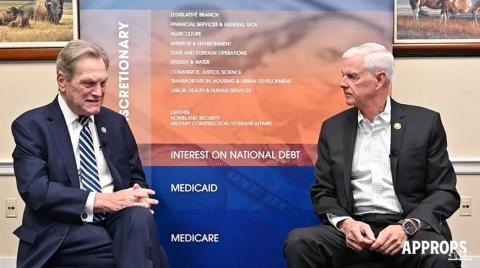Building America's Future: Transportation and Housing Priorities with Subcommittee Chairman Womack
In this in-depth installment of the Appropriations 101 series, Transportation, Housing, and Urban Development (THUD) Subcommittee Chairman Steve Womack (R-AR) describes the details and challenges of the FY25 THUD Appropriations bill.
When speaking with Interior and Environment Subcommittee Chairman Mike Simpson (R-ID), Womack emphasized the need for Congress to address our growing deficit and offered practical, THUD-related solutions to address the issue.
The two spoke on the increasingly fragile American road and highway system, addressing the air traffic control shortage, and upholding safe and affordable housing for our most vulnerable citizens.

Watch Subcommittee Chairman Simpson and Subcommittee Chairman Womack’s conversation here.
Womack: “It's important for everybody watching this to know that appropriations is simply the discretionary side of the budget. We’ve got two different categories – we’ve got mandatory spending, and we’ve got discretionary spending. So, we're talking about discretionary spending. It's about a third of government spending, but it's divided up 12 ways. You've got a big piece in Defense, you’ve got a pretty big piece in Labor, Health and Human Services, and Education, and you got another pretty good-sized piece in Transportation, Housing, and Urban Development. That's what we're talking about today, what we call THUD. It's one of the 12, and there are others. And so, my bill is focused on funding the discretionary items associated with all things transportation and all things housing. It’s roughly, in terms of appropriated dollars, about $90 [billion] plus.”
Simpson: “Well, nobody knows that better than Steve, he was Chairman of the Budget Committee for a period of time. What we're trying to help the public understand, is the discretionary budget … is only about one-third of the overall budget. In fact, it's less than that. Two-thirds of [all federal expenditures are] mandatory spending - that's Medicare, Medicaid, Social Security … If we don't get control of that, we're never going to be able to balance this budget… We've got to have the courage to talk about mandatory spending and how we're going to address that for the future. Or else those programs are not going to be there for our kids and grandkids.”
Womack: “The other thing that needs to be said in a piece like this, is that discretionary spending, and we can have our debates about what's wasteful spending and what's not, but discretionary spending is vitally important. I mean, discretionary spending includes keeping our national parks open. Discretionary spending includes every dime that we're spending to defend this country against all enemies, foreign and domestic, as we have to say in our oath. Discretionary spending is what funds cancer research and other issues related to the National Institutes of Health or the CDC and what have you. It's all discretionary spending. What Mike just said is absolutely true, in that the deficit, the difference between how much we'll bring in and how much will go out, is going to be, this year, about $1.7-1.8 [trillion], nearly $2 trillion - a significant amount of money. The entire discretionary budget of the U.S. government is $1.6 [trillion]. So, you have to get into the mandatory programs and either restructure, or infuse them with more revenue, or cut programs if you're going to save this country from certain fiscal calamity, and [Congress] just doesn’t have the courage to do that.”
###
